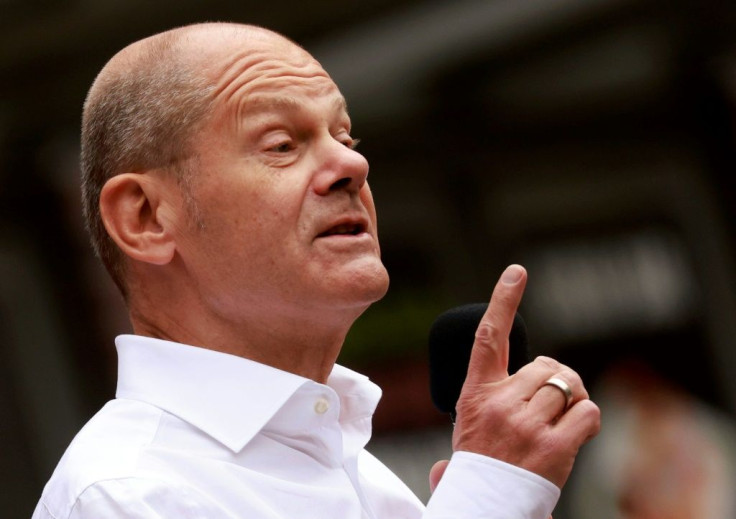Olaf Scholz: 'Robotic' Social Democrat Within Grasp Of Merkel's Job
Olaf Scholz, the centre-left Social Democrat (SPD) candidate to succeed Angela Merkel, is often described as boring, but could be on the verge of a sensational upset after Sunday's election.
With polls showing the SPD narrowly ahead of Angela Merkel's CDU-CSU conservative alliance, Scholz may have achieved something many would have thought impossible just a year ago.
His SPD scored just 20.5 percent in Germany's last election in 2017 and has had a difficult few years in coalition with the CDU-CSU, but looks on course to win at least 25 percent of the vote this time.
"It's going to be a long election night, that's for sure," Scholz said after the first estimates were released.
"But this is certain: that many citizens have put their crosses next to the SPD because they want there to be a change in government and also because they want the next chancellor to be called Olaf Scholz."
Nicknamed "Scholzomat" for his robotic speeches, Scholz is one of Germany's most influential politicians, with a reputation for being meticulous, confident and fiercely ambitious.
As finance minister and vice-chancellor under Merkel, he enjoys a close relationship with the chancellor and has even sought to position himself as the true Merkel continuity candidate, despite hailing from a different party.
He was pictured recently on the cover of the Sueddeutsche Zeitung magazine adopting Merkel's famous "rhombus" hand gesture -- a stunt that provoked consternation from rivals in Merkel's CDU camp.
During his time as finance minister, Scholz has cemented his reputation for being on the fiscally conservative side of his workers' party.
Despite agreeing to suspend Germany's cherished "debt brake" to stave off the crippling effects of the coronavirus pandemic, he has insisted on a return to the policy by 2023.
"All this is expensive, but doing nothing would have been even more expensive," he said at the time.
Scholz's cautious approach has at times seen him marginalised within the SPD, overlooked in a leadership vote in 2019 in favour of two relatively unknown left-wingers.

But he has got behind the SPD's flagship policies in the election campaign, backing a planned wealth tax and an increase in the minimum wage.
Despite his tight grip on Germany's finances, Scholz has been known to loosen the purse strings, notably as mayor of Hamburg from 2011 to 2018, when he bailed out the wildly over-budget Elbphilharmonie concert hall.
For Scholz, whose motto is "I can only distribute what I have", the spending was justified by the city-state's healthy finances.
Born in the northern city of Osnabrueck, Scholz joined the SPD as a teenager.
He flirted with its more left-wing ideals but soon came to prefer a more centrist course.
After training as a lawyer specialising in labour issues, Scholz was elected to the national parliament in 1998. He married fellow SPD politician Britta Ernst that same year.
It was during his 2002-2004 stint as the SPD's general secretary that he earned the "robot" moniker for his dry yet tireless defence of the unpopular labour reforms of his idol, then-chancellor Gerhard Schroeder.
As labour minister in Merkel's first coalition government from 2007 to 2009, Scholz helped avert mass lay-offs during the financial crisis by convincing firms to cut workers' hours with the state topping up their salaries -- a policy repeated during the pandemic.
Scholz himself has admitted he is "not someone who is particularly emotional in politics".
But his calm demeanour has helped him weather some turbulent times during his stint as finance minister, including the Wirecard fraud debacle.
Wirecard, once a rising star on the German fintech scene, filed for bankruptcy last year in what has been described as Germany's biggest post-war accounting scandal.
More recently, Scholz has come under fire over allegations that the FIU anti-money laundering authority, under his finance ministry, failed to report potential wrongdoing to the relevant authorities.
© Copyright AFP 2024. All rights reserved.




















